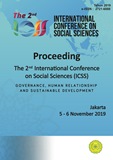DEVELOPMENT POLICY KAMPUNG BANTAR IN REALIZING SMART CITY IN JAMBI CITY, INDONESIA
Abstract
This paper discusses the emergence of smart city as a new direction for city development. Today, smart cities are increasingly popular among local governments in Indonesia, including the Jambi City government. This paper intends to describe the policy of the Jambi city government in realizing smart city with a focus on the utilization of RT-based urban villages (Kampung Bantar) and their meaning for the welfare of urban residents. To explain this case, qualitative research methods are used. This approach was chosen because this research is related to the complexity of the understanding of the local government regarding smart city. This research requires secondary data in the form of official government documents such as several regional regulations, mayor decisions and regulations, as well as various documents related to the city development policy towards smart city. Primary data is also used in the form of interviews with informants obtained through in-depth interviews. This article will answer the general question: how is the smart city in Jambi city implemented? Specifically, it will answer: how is the role of the village in realizing smart city and giving meaning to the welfare of urban residents. The findings show that the success of the Jambi City government in implementing smart city is a strong commitment from the local government by initiating innovations in utilizing RT-based settlements to face the city development towards smart city.Keywords: Kampung Bantar, Smart City and WelfareReferences
Bakıcı, Tuba, Esteve Almirall, and Jonathan Wareham. (2013). “A Smart City Initiative: the Case of Barcelona”. J Knowl Econ 4:135–148.
Chourabi, Hafedh, et.al. (2012). Understanding Smart Cities: An Integrative Framework. 45th Hawaii International Conference on System Sciences. IEEE Computer Society. Page 2298-2297.
Griffinger, R., et/ al. (2007). Smart cities Ranking of European medium-sized cities. Final report October.
Harrison, C., Eckman, B., Hamilton, R., Hartswick, P., Kalagnanam, J., Paraszczak, J., & Williams, P. (2010). Foundations for Smarter Cities. IBM Journal of Research and Development, 54(4).
Indranata, Iskandar: (2008). Pendekatan Kualitatif Untuk Pengendalian Kualitas. Jakarta: Univeritas Indonesia (UI-Press).
Kurniadi, dkk. (2009). Menuju Bekerjanya Tata Pemerintahan Lokal Yang Baik: Partisipasi, Transparansi, dan Akuntabilitas. Monograph on Politics & Government. Vol.3. No.1
Neirottia, Paolo, et.al. 2014. “Current trends in Smart City initiatives: some stylized facts”. CITIES, vol. 38, pp. 25-36.
Paskarina, dkk. (2015). Berebut Kontrol atas Kesejahteraan. Yogyakarta. PolGov.
PSPPR UGM. (2016). Road Map Kota Yogyakarta Menuju Smart City. Yogyakarta.
Rosyadi, Slamet. (2010). Paradigma Baru Manajemen Pembangunan. Yogyakarta, Gava Media.
Senate Department for Urban Development and the Environment. (2015). Smart City Strategy Berlin. A Report of The “Berlin Strategy Urban Development Concept Berlin 2030”.
Supangkat, S. H. (2015). Essay Smart City Development in Indonesia and Asian African Nations. IEICE Global Plaza no. 78.
Supangkat, S. H., dkk. (2015). Pengenalan dan Pengambangan Smart City. Bandung: e-Indonesia Initiative dan Institut Teknologi Bandung(ITB).
Widyaningsih, D. (2014). Kota Surabaya Menuju Smart City. Tesis. Yogyakarta: Universitas Gadjah Mada.


